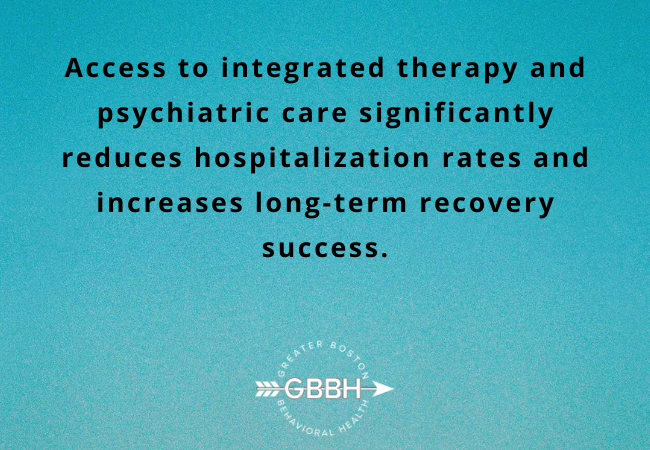Taking the first step toward mental health support is an empowering decision—but it can also come with questions: Do I need a full mental health program or just weekly therapy sessions? How do I know if my symptoms require more structured care?
At Greater Boston Behavioral Health, we offer both traditional outpatient therapy and comprehensive Mental Health Programs in Boston. Understanding the differences between these options—and knowing which best fits your current needs—can help you make the right choice for your emotional well-being.
In this blog, we break down what each type of care involves, who it helps, and when to consider stepping into a higher level of support.
What Is Weekly Outpatient Therapy?
Weekly therapy (also known as traditional outpatient therapy) involves meeting with a licensed therapist once a week for 45–60 minutes. It’s often used to:
- Manage mild to moderate symptoms of anxiety, depression, or stress
- Process grief, life transitions, or relationship challenges
- Build long-term coping skills
- Maintain progress after completing a more intensive program
Our Mental Therapy Programs in Boston include expert-led outpatient therapy using evidence-based modalities such as:
- Cognitive Behavioral Therapy Boston (CBT)
- Dialectical Behavior Therapy in Boston (DBT)
- Anger Management Therapy in Boston
- Trauma-informed therapy
- Mindfulness-based practices
Weekly therapy is highly flexible and works well for individuals with stable routines and good day-to-day functioning.
What Is a Mental Health Program?
A mental health program refers to more structured, multi-hour treatment options that take place multiple days per week. These include:
- Intensive Outpatient Program in Boston (IOP): 3–5 days/week, 2–4 hours/day
- Partial Hospitalization Program in Boston (PHP): 5 days/week, 4–6 hours/day
- Residential Treatment Program in Boston: 24/7 live-in care
- Inpatient Treatment Program in Boston: Hospital-based, acute psychiatric stabilization
Mental health programs are designed for individuals experiencing moderate to severe mental health symptoms that interfere with functioning at work, school, or home—or for those who are stepping down from crisis or inpatient care.
These programs often include:
- Daily or near-daily group therapy
- Individual counseling
- Psychiatric evaluations and medication management
- Skill-building workshops (e.g., CBT, DBT, trauma therapy)
- Relapse prevention and aftercare planning
Key Differences: Weekly Therapy vs. Mental Health Program
| Feature | Weekly Therapy | Mental Health Program (IOP/PHP) |
|---|---|---|
| Frequency | 1 session/week | 3–5 days/week |
| Session Length | 45–60 minutes | 2–6 hours/day |
| Structure | Flexible | Structured, scheduled programming |
| Support Level | Low to moderate | Moderate to high |
| Includes Group Therapy? | Rarely | Frequently |
| Includes Psychiatric Care? | Sometimes | Always |
| Best For | Mild symptoms, stable routines | Moderate-severe symptoms, risk of crisis, transition from inpatient care |
Signs You May Only Need Weekly Therapy
You may benefit from traditional weekly therapy if you:
- Are able to function at work or school
- Want to process life events, grief, or stress
- Have a mild mental health diagnosis (e.g., generalized anxiety)
- Are not in immediate danger of harm to yourself or others
- Need ongoing support for personal growth or relapse prevention
Weekly therapy is also ideal as a follow-up to more intensive treatment like PHP or IOP.
Signs You May Need a Full Mental Health Program
It may be time to consider a structured mental health program if:
- Your mental health symptoms are interfering with daily life
- You’ve tried weekly therapy but aren’t seeing improvement
- You’ve experienced suicidal thoughts or self-harm behaviors
- You’re isolating, avoiding responsibilities, or overwhelmed by emotion
- You’ve had a recent psychiatric hospitalization or emergency room visit
- You’re struggling with dual diagnosis (mental health + substance use)
Programs like IOP or PHP provide the intensive, daily support necessary to help stabilize symptoms and begin true healing.
How Psychiatric Care Fits Into the Equation
One of the major advantages of mental health programs is integrated psychiatric support. At Greater Boston Behavioral Health, we offer:
- Psychiatric assessments
- Medication management and monitoring
- Co-treatment for depression, anxiety, PTSD, and bipolar disorder
- Coordination with therapists for holistic care
If you’re struggling with mood stability, severe anxiety, trauma responses, or medication adjustments, psychiatric care in Boston through a mental health program can be essential to recovery.
How Life Disruptions Can Signal the Need for Structured Care
Sometimes it’s not a specific diagnosis that points to the need for a mental health program—but the way your symptoms are disrupting your day-to-day life. Even if you’ve been managing with weekly therapy, you may notice signs that a higher level of care is needed when:
-
You’re frequently missing work, school, or social commitments
-
Your sleep, appetite, or energy levels are significantly off
-
You’re withdrawing from relationships or isolating
-
Everyday tasks feel overwhelming or impossible
-
Emotional outbursts or shutdowns are becoming more frequent
These disruptions are red flags that your current support level may no longer be enough. A Partial Hospitalization Program in Boston (PHP) or Intensive Outpatient Program (IOP) can provide daily therapeutic structure and help restore emotional balance.
Stepping Up — or Down — in Care Isn’t a Failure
It’s important to remember: needing more help is not a sign of weakness—it’s a sign of awareness. Many people hesitate to move from weekly therapy to a structured program because they fear it means they’ve failed. But in reality, stepping up into IOP or PHP is often what allows recovery to deepen.
Likewise, stepping down after completing a structured program (into weekly therapy or less frequent sessions) is a healthy sign of progress.
At Greater Boston Behavioral Health, we help clients move fluidly between levels of care—with compassion, continuity, and your long-term healing in mind.
What If You’re Not Sure Which You Need?
If you’re uncertain whether you need weekly therapy or a more structured mental health program, we recommend scheduling a clinical assessment at our Mental Health Treatment Center Boston.
Our experienced team will evaluate:
- Your current symptoms
- Past treatment history
- Daily functioning and support system
- Psychiatric needs
- Risk level and immediate goals
From there, we’ll help you determine whether outpatient therapy, IOP, PHP, or a higher level of care is the right starting point for you.
Why Choose Greater Boston Behavioral Health?
At Greater Boston Behavioral Health, we believe that every person deserves access to care that meets them exactly where they are—whether that means weekly support or daily structured therapy.
We offer:
- Full spectrum of care: outpatient therapy, IOP, PHP, inpatient, and residential
- Specialized treatments like CBT, DBT, and anger management therapy
- In-house psychiatric support for medication and diagnostics
- Trauma-informed, culturally inclusive, and person-centered care
- A dedicated team that walks with you from first call to full recovery
Our mission is simple: to help you feel better, function better, and live more fully.
Conclusion
No matter where you are on your mental health journey—whether you’re exploring therapy for the first time or feeling stuck in your current routine—there is a level of support that fits you.
At Greater Boston Behavioral Health, we offer both weekly outpatient therapy and more intensive mental health programs like IOP, PHP, and residential care. And we’re here to help you figure out which one makes the most sense for your current needs.
You don’t have to keep struggling alone. There is no “right” starting point—only the decision to start. Call (888) 278-0716 to schedule a confidential assessment and get matched with the care that meets you where you are.
FAQ on Weekly Therapy and a Mental Health Program
What is the difference between weekly therapy and a mental health program?
Weekly therapy typically involves one 45–60 minute session per week. Mental health programs like IOP or PHP provide structured therapy multiple days a week, with additional psychiatric support.
When should I consider a mental health program instead of weekly therapy?
If you’re experiencing intense symptoms, not improving with outpatient therapy, or struggling with daily responsibilities, a more structured program like IOP or PHP may be more appropriate.
Can I switch from weekly therapy to a mental health program later?
Absolutely. Many clients start with weekly therapy and step up to a more intensive program when symptoms worsen or when more support is needed.
What happens after I complete a mental health program?
Most clients step down to weekly outpatient therapy to maintain progress, supported by continued psychiatric care if needed.
Does Greater Boston Behavioral Health offer both therapy and structured programs?
Yes. We offer a full continuum of care—from outpatient therapy and IOP to PHP, residential, and inpatient programs.


